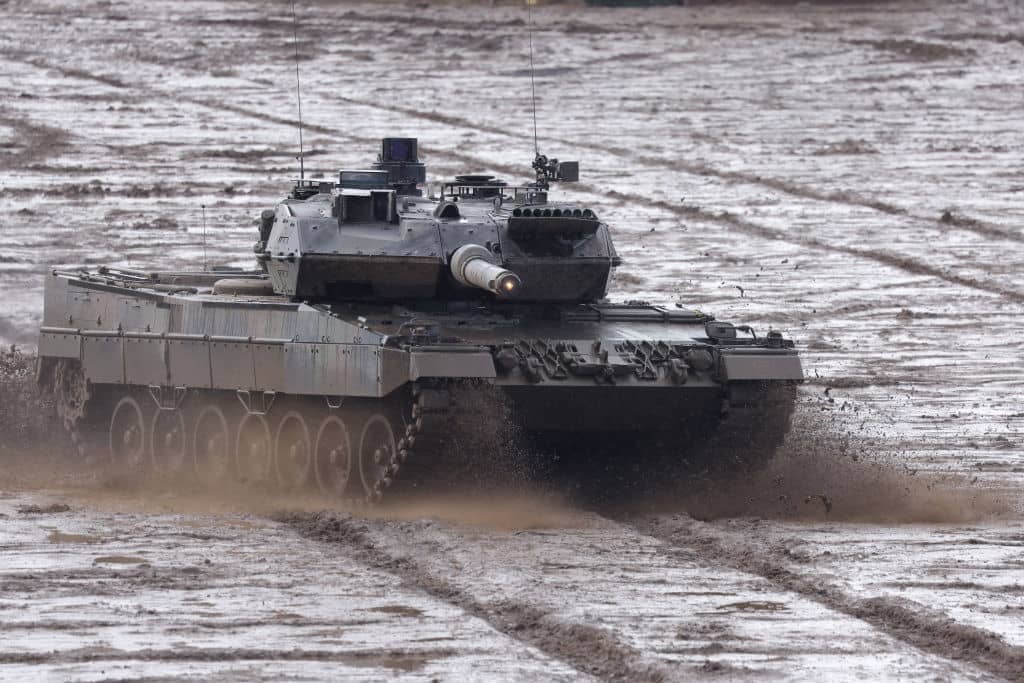In his novel The Loyal Subject, which appeared on the eve of the first world war, Heinrich Mann, the brother of Thomas, satirised Wilhelmine Germany as a hotbed of chauvinistic nationalism.
The servile nationalism that Mann mocked could not be further from the ethos of the Federal Republic of Germany today. So pervasive is Germany’s eirenic disposition that on Thursday, as Russian president Vladimir Putin ravaged Ukraine, Lieutenant General Alfons Mais, the head of the German army, took the unusual step of turning to LinkedIn to ventilate his exasperation at the impotence of his own fighting forces. ‘In my 41st year of peace-time service, I would not have thought that I would have to experience a war,’ Mais stated on Thursday. ‘And the Bundeswehr, the army which I have the honour to command, is standing there more or less empty-handed. The options we can offer the government in support of the alliance are extremely limited… I am pissed off!’
The blunt fact is that the only thing more dangerous for Europe than a strong Germany is a weak one
He’s not the only one. American presidents, including but not limited to the dreaded Donald J. Trump, have for years been exhorting the Germans to cinch up their collective Lederhosen, put down the Weissbier and go all-in when it comes to the defence of Europe rather than rely on Uncle Sam for protection. In elite foreign-policy circles on both sides of the Atlantic, the term du jour is burden-sharing, a polite phrase for demanding that the Germans and the rest of western Europe cough up for a serious defence of the continent. So far, these pleas, however well-intentioned, have mostly been met with a collective yawn. Are things about to change?
Jawohl! In Germany, public sentiment toward Russia is rapidly shifting. Social-Democratic Prime Minister Olaf Scholz put the Nord Stream 2 gas pipeline on hold and blamed him for creating ‘sorrow and destruction’ in Ukraine. Scholz’s vice-chancellor Robert Habeck confessed to the public broadcaster ZDF, ‘in retrospect, one must say…that the West was too naïve.’
It isn’t mere talk. Germany is set to increase its military spending significantly, with Finance Minister Christian Lindner of the liberal Free Democratic Party announcing that Putin’s move marks a ‘turning point’ for investing in the Bundeswehr. Former Defence Minister Annegret Kramp-Karrenbauer noted that Germany had neglected to prepare to deter Putin. Chancellors Helmut Schmidt and Helmut Kohl had supported the installation of Pershing Cruise missiles in the early 1980s in Germany to counter the Soviet SS-20 missiles: the peace is only kept by maintaining a true deterrent. Early reports are that Germany may increase its outlays by almost €40 billion through 2026.
The blunt fact is that the only thing more dangerous for Europe than a strong Germany is a weak one. A power vacuum exists in Central Europe that can only be filled by Berlin. The collapse of the Austro-Hungarian empire during world war one, followed by the demise of the Hohenzollern dynasty, opened the path for Russia to enter the heart of Europe, which it did after 1945. The division of Germany between the two superpowers meant that a cold peace prevailed. But the reunification of Germany in 1989 ensured that the old geopolitical questions, however much Germans themselves tried to shirk them, began to re-emerge. It’s no accident that Ukraine, where Germany tangled with Russia during both world war one and world war two, has emerged as the new fulcrum of conflict between East and West. Germany, which has been living in its own dream palace for the past several decades, is now being confronted with a resurgent and revanchist Russia that it, and it alone, can repel. If it does not, Putin, like Stalin, will surely move to establish a new imperium in Russia’s image that ranges from the Baltic States to Hungary. To rely on America, riven by internal cultural and political disputes, would be a recipe for disaster for Europe.
No doubt anyone searching for a return to the furor Teutonicus of yesteryear, when German hordes led by Arminius defeated the Roman legions, is bound to be disappointed. The last effective Teutonic fighting force was the East German National People’s Army, which marched into Czechoslovakia in 1968—the second time in the past century that German troops occupied the country—and sent advisers and instructors to Algeria, Ethiopia, Libya, and Mozambique, not to mention helping to train Middle East terrorists.
Today, a return to older German traditions is bound to raise some eyebrows. As the distinguished historian Michael Burleigh remarked to me, the German army is ‘underwhelming and poorly equipped, but, hey, who wants a Wehrmacht 2.0?’ With Putin on the march, it appears that Germans increasingly do.






Comments